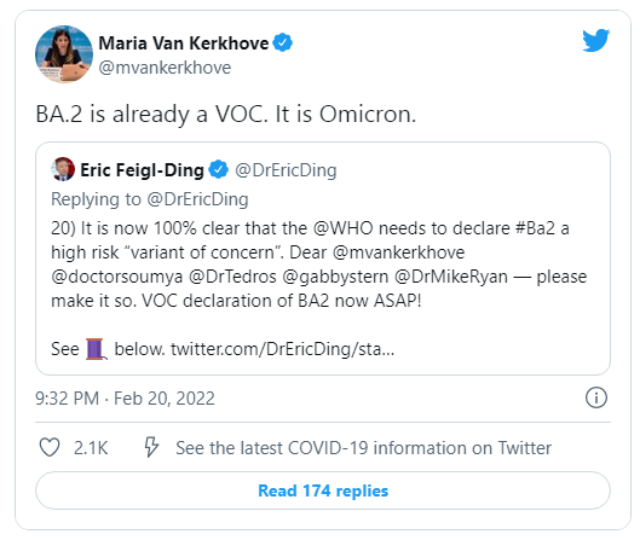A new and more infectious and dangerous variant of Omicron, currently named Omicron BA.2 subtype variant, has emerged that is also important but less discussed than the situation in Ukraine. (Editor’s note: According to the WHO, the Omicron strain includes the b.1.1.529 spectrum and its descendants ba.1, ba.1.1, ba.2 and ba.3. ba.1 still accounts for the majority of infections, but ba.2 infections are on the rise.)
BUPA believes that further volatility in international markets over the past few days is due to the deterioration of the situation in Ukraine, and another reason is the new variant of Omicron, a new variant of the virus that the agency believes is rising in risk and whose macro impact on the global economy may be even more important than the situation in Ukraine.
According to the latest findings from the University of Tokyo in Japan, the BA.2 subtype variant not only spreads faster compared to the currently prevalent COVID-19, Omicron BA.1, but may also cause severe illness and appears to be able to thwart some of the key weapons we have against the COVID-19.
The researchers infected hamsters with BA.2 and BA.1 strains, respectively, and found that those infected with BA.2 were sicker and had more severe lung damage. The researchers found that BA.2 may even circumvent some of the antibodies produced by the vaccine and is resistant to some therapeutic drugs.
The researchers of the experiment said, “Neutralization experiments suggest that vaccine-induced immunity does not work as well against BA.2 as it does against BA.1.”
Cases of BA.2 variant virus have been reported in many countries, and the World Health Organization estimates that BA.2 is about 30 percent more infectious than the current BA.1, which has been found in 74 countries and 47 U.S. states.
This subvariant virus accounts for 90% of all recent new cases in Denmark. Denmark has seen a recent rebound in the number of cases that have died due to infection with the COVID-19.
The findings from the University of Tokyo in Japan and what is happening in Denmark have alerted some international experts.
Epidemiologist Dr. Eric Feigl-Ding took to Twitter to call out the need for the WHO (World Health Organization) to declare the new variant of Omicron BA.2 a cause for concern.
Maria Van Kerkhove, WHO’s technical lead for the new coronavirus, also said that BA.2 is already a new variant of Omicron.
The researchers stated.
“Although BA.2 is considered to be a new mutant strain of Omicron, its genome sequence is very different from BA.1, suggesting that BA.2 has a different virological profile than BA.1.”
BA.1 and BA.2 have dozens of mutations, especially in key portions of the viral stinger protein. Jeremy Luban, a virologist at the University of Massachusetts Medical School, said BA.2 has a whole bunch of new mutations that no one has tested for.
Mads Albertsen, a bioinformatician at Aalborg University in Denmark, said the steadily increasing spread of BA.2 in several countries suggests it has a growth advantage over other variants, including other subtype variants of Omicron, such as the less popular spectrum known as BA.3.
A study of more than 8,000 Danish families infected with omicron suggests that the increased rate of BA.2 infection is due to a variety of factors. Researchers, including Troels Lillebaek, an epidemiologist and chairman of the Danish Committee for Risk Assessment of COVID-19 Variants, found that unvaccinated, dual-vaccinated and booster-vaccinated individuals were all more likely to be infected with BA.2 than BA.1 infection.
But Lillebaek said BA.2 may pose a greater challenge where vaccination rates are low. The growth advantage of this variant over BA.1 means it can prolong the peak of omicron infection, thereby increasing the chances of infection in the elderly and other people at high risk for serious disease.
But there’s a bright spot: antibodies in the blood of people who have recently been infected with omicron virus also appear to offer some protection against BA.2, especially if they’ve also been vaccinated.
This raises an important point, says University of Washington School of Medicine virologist Deborah Fuller, that while BA.2 appears to be more infectious and pathogenic than Omicron, it may not end up causing a more devastating wave of COVID-19 infections.
The virus is important, she said, but so are we as its potential hosts. We’re still in a race against the virus, and it’s not time for communities to lift the mask rule.
Post time: Mar-01-2022


